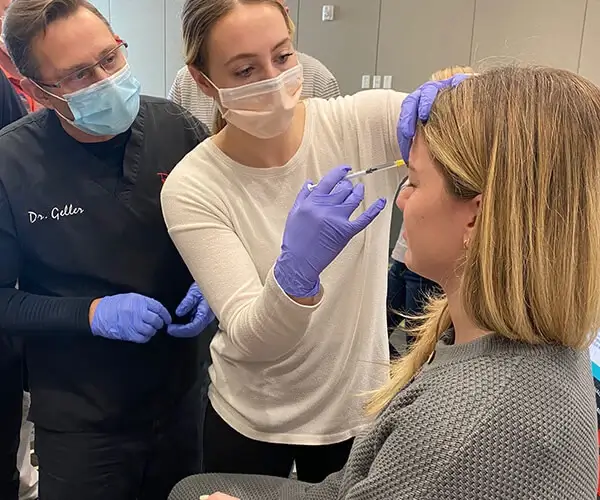Can Botox® Cause Blindness?
By Dr. Stephen Cosentino
PRESIDENT OF EMPIRE MEDICAL TRAINING
While generally regarded as safe, Botox does come with well-known side effects. The severity and type of these side effects can vary depending on where Botox is injected on the face or neck. Common side effects may include a droopy eyelid (ptosis), an asymmetrical smile, or temporary paralysis of specific muscles.
The Concern: Botox and Blindness
Recently, a potentially serious side effect has garnered increased attention: blindness following cosmetic injections. You may have encountered rumors or claims about patients losing their vision after Botox treatments. These allegations are serious and warrant careful consideration. Let’s distinguish between fact and misinformation.
The Reality: No Documented Cases of Botox-Induced Blindness
Despite the circulation of these rumors, there are no documented cases of Botox causing blindness. A comprehensive meta-review of post-injection blindness reports examined at least 50 incidents worldwide over the past two decades. Notably, this review did not implicate Botox in any of these cases.
While this doesn't entirely eliminate the possibility that Botox could cause blindness under certain circumstances, it does suggest that the risk is extremely low. Blindness following any type of facial injection is already a rare occurrence, and it appears to be even less common following botulinum toxin injections.
Understanding the Risk Factors
The risk of vision-related complications from Botox injections is minimized when the practitioner avoids areas around the eye that aren't suitable for Botox injection. When administered correctly by a trained professional, the risk becomes negligible.
Dermal Fillers and Vision Risks
Interestingly, other types of cosmetic injections appear to pose a higher risk of vision-related complications, though the overall risk remains extremely low. Specifically, dermal fillers have been implicated in several dozen cases of blindness, according to the meta-study and anecdotal evidence from patients and providers.
- Hyaluronic acid, the most common type of dermal filler, has been associated with some instances of blindness.
- Other implicated fillers include calcium hydroxylapatite (CaHa) and poly-L-lactic acid (PLLA).
The Mechanism Behind Filler-Related Vision Issues
The proposed mechanism for vision loss related to dermal fillers involves the formation of blood clots caused by filler injection into blood vessels. When these clots form in the vessels supplying oxygen and nutrients to the eye and ocular nerves, cell death may occur. Given that adult nerve cells regenerate slowly or not at all, any resulting blindness or vision impairment may be permanent.
Why Botox May Be Less Likely to Cause Blindness
Botox appears less likely to cause blindness because it doesn't form clots as readily when injected into blood vessels. However, it's important to note that injecting Botox into blood vessels can lead to other problems, some of which could be serious.
Potential Vision-Related Side Effects of Botox
While Botox may not cause blindness, it's not entirely risk-free. Certain Botox side effects and complications can temporarily affect vision:
- Droopy eyelid (ptosis)
- Dry eyes
- Blurred or double vision
- Difficulty closing the eyes completely
The silver lining is that these side effects are temporary, typically lasting only as long as the Botox itself (generally three to six months).
Ensuring Safe Botox Treatment
The most effective way to avoid any vision-related side effects is to choose an experienced, licensed, board-certified provider who has completed an accredited botulinum toxin training course. Even though Botox hasn't been implicated in any cases of blindness to date, it's prudent to take all possible precautions to minimize its other risks.
Key Factors in Choosing a Botox Provider
- Verify the provider's credentials and certifications
- Ensure they have specific training in facial aesthetics and Botox administration
- Check for positive patient reviews and before-and-after photos
- Confirm that they use FDA-approved products and follow proper injection techniques
- Make sure they conduct a thorough consultation and medical history review before treatment
The Importance of Proper Technique and Training
The safety and efficacy of Botox treatments largely depend on the skill and knowledge of the provider. Proper injection technique involves:
- Accurate identification of facial muscles and their function
- Precise dosing based on individual patient needs
- Understanding of facial anatomy to avoid critical structures
- Knowledge of potential complications and how to manage them
Healthcare providers who undergo comprehensive training are better equipped to deliver safe and effective treatments while minimizing the risk of adverse effects.
The Role of Patient Education
As a patient considering Botox treatments, research the procedure, its potential risks, and expected outcomes. Here are some steps you can take:
- Research the procedure and its potential side effects
- Discuss your medical history and any concerns with your provider
- Ask about the provider's experience and training
- Understand the expected results and timeline for improvement
- Follow all pre- and post-treatment instructions carefully
Conclusion: Balancing Benefits and Risks
While the concern about vision loss following Botox injections is understandable, the evidence suggests that this risk is extremely low when the treatment is administered by a qualified professional. The temporary nature of most Botox-related side effects, combined with its proven efficacy in addressing various cosmetic and medical concerns, contributes to its continued popularity.
Always approach any cosmetic procedure with a clear understanding of both its benefits and potential risks. By choosing a well-trained, experienced provider and maintaining open communication throughout the treatment process, patients can maximize the benefits of Botox while minimizing potential complications.
Remember, your safety should always be the top priority. Don't hesitate to ask questions, voice concerns, and seek second opinions if needed. With the right approach and a qualified provider, Botox can be a safe and effective tool for achieving your aesthetic goals.


